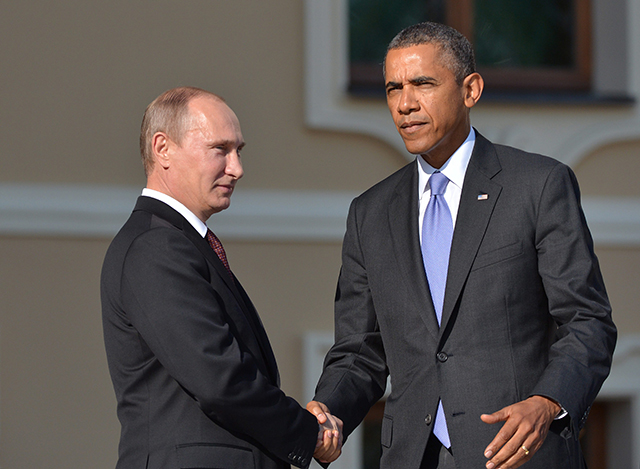Several years before becoming president, Obama told a Chicago TV station, “I don’t agree with a missile defense system.”
That’s nice. Unfortunately, rogue states such as North Korea and Iran have a different worldview. So does Vladimir Putin.
The recent Ukraine crisis, and the question of the best United States response to it, presents a very good opportunity for President Obama to get on the right side of history, as Secretary John Kerry might say, on missile defense.
The nuclear weapons landscape is more complex today than ever before. Yet the administration, for all its talk about Russia not realizing we’re living in the 21st century, itself refuses to recognize that its own policy of Cold War-style arms control is outdated and woefully inadequate to deal with the current set of bad actors and threats to the U.S. around the globe.
Obama has built a legacy of surrendering to the Russians on the issue of missile defense.
He made a reckless decision in 2009 to renege on President George W. Bush’s agreement with Poland and the Czech Republic to build an interceptor site and radar in their two countries that would protect them, other European allies, and the U.S. homeland from ballistic missiles. The Poles and Czechs understandably felt betrayed and today, along with the rest of Eastern Europe, have every reason to question Obama’s commitment to place a check on Putin now.
Obama replaced the Bush policy with his own plan, the European Phased Adaptive Approach. His rationale for the change tried to make it sound like a technical improvement, but it was nothing of the kind. It was all about geopolitics. It was caving in to Russia, and was one of the first moves signaling this White House cared more about not ruffling Putin’s feathers than it did about promises made to our friends and allies, and even more importantly, protecting the American people.
But the appeaser in chief wasn’t done yet “resetting” our relationship with Russia.
His agreement to the New Strategic Arms Reduction Treaty (New START) in 2010 was another win-win for Russia and a complete loss for the United States. The administration talks about the importance of a “strategic balance” between our two countries, but the treaty heavily tips the scales Russia’s way.
Russia is engaged in the largest nuclear weapons buildup since the end of the Cold War and according to its defense officials, it plans to spend more than $55 billion on missile and air defense systems in the next six years. Last June, Putin actually projected the number to be over $90 billion.
And the U.S.? Under the treaty, the U.S. must reduce its nuclear weapons program. Negotiating skills are apparently not required to get a job in the Obama State Department.
Thirty-three minutes is the longest it would take for a nuclear missile fired from anywhere in the world to reach the United States. It is a terrifying fact. The most likely initiators of such a threat, rogue nations like Iran and North Korea, get closer every day to having the nuclear capabilities to launch a long-range ballistic missile aimed at the continental U.S. and our allies in Europe. The aborted plans for missile defense installations in Poland and the Czech Republic, among other missile defense programs Obama has gutted or cancelled, would have gone a long way in addressing this threat.
Those living in Ukraine and Poland and the Baltic states have every reason to be fearful of what Russia might do next and Putin’s expansionist intentions. But a policy of appeasement toward Russia has not only proven to be a danger to them; it has also allowed a serious threat to the United States to grow.
There are several actions President Obama should take to ensure Putin knows we mean business. None is more important than withdrawing from New START and recommitting to a robust missile defense system in Europe.
Putin shows no indication of backing down. Sadly, Obama shows no indication of standing up.
